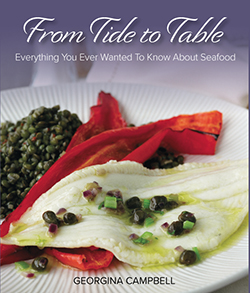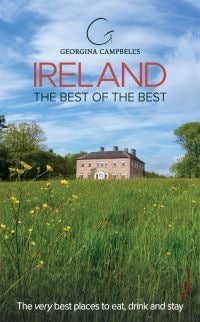The Darina Allen Column - Obesity
 This month Darina focuses on the shocking problem of obesity, its cost in human and financial terms - and gives her 10 Top Tips to avoid it
This month Darina focuses on the shocking problem of obesity, its cost in human and financial terms - and gives her 10 Top Tips to avoid it
Safefood Ireland, recently commissioned a report on The Cost of Overweight and Obesity on the Island of Ireland. The report which was compiled with the help of the HSE (Health Service Executive) and NUI (National University of Ireland) Galway, DCU (Dublin City University), IPH (Institute of Public Health Ireland), National Cancer Registry Ireland, Queens University Belfast and Safe Food highlighted the lack of information to date.
This comprehensive assessment of the cost of overweight and obesity in Ireland began in 2012 – the findings are quite simply shocking, 60% of Irish people are now overweight or obese and the cost to the exchequer read taxpayer is up to 9% of total healthcare. That’s bad enough but indirect costs may be as much again or even more.
Direct costs include In-Patient, Out-Patient, General Practice – drugs and prescription costs.
Indirect costs include lost productivity in the work place due to overweight and obesity related illness, premature mortality.
The list of chronic conditions associated with overweight and obesity is long and scary, high blood pressure, coronary heart disease, heart failure, stroke, clot on lung, back pain, osteoarthritis, diabetes, asthma, gout, gallbladder disease, colon cancer, oesophageal cancer...
The chance of getting Type 2 diabetes increased by 140% in overweight men and 574% in men who are obese.
In women, it’s significantly higher 292% when overweight but a shocking increase of 1141% when obese. To see the whole report click here
So what to do, well I don’t have a magic bullet but this much I do know – we’ll all feel much better if we eliminate all processed foods from our diets.
Darina’s 10 Top Tips to fight obesity:
1. Buy only or mostly fresh food, in season with the exception of bananas and citrus and avoid anything that makes health claims.
2. Find a butcher you can trust, learn about inexpensive cuts of meat and offal and find out how to cook them.
3. Eliminate all fizzy drinks totally from your diet and all breakfast cereals, with the exception of porridge, muesli and granola.
4. Eat lots of peas, beans, pulses and good grains – they are an easy inexpensive form of protein and are endlessly versatile.
5. Don’t eat between meals, standing up or on the run. Sit down around a table, eat slowly, you’ll find that you are eating less and enjoying your food more.
6. Grow some of your own food, something, anything, anywhere, in any container you can find – on the windowsill, balcony, back yard, haggard field, just do it.
7. Get a few hens, you don’t need much space, if you put them in a roomy chicken coop and move them around your lawn. They must have fresh grass to healthy, otherwise forget about it and source the best you can from a local farmer country market or local shop. What kind of a country do we live in where it is illegal for your local shop to sell local farmers eggs, unless they are registered (quite a mission)
8. Mothers and fathers of Ireland rise up and insist that the supermarkets remove all sweets and bars away from the tills where you queue with your children and while you are at it ask for a crèche so you don’t have to bring your child into the supermarket at all. Don’t underestimate the effect of pester power.
9. Whenever possible, support small local shops, it’s a different kind of shopping, more personal and you’ll find dirty carrots and potatoes, yippee!
10. Avoid all light, low fat and diet foods and lets cut our sugar intake by half immediately.
And last but not least, buy Michael Pollan’s book ‘Food Rules’ it only costs about €6.00 and it could change your life!
 Seasonal Recipe: Blood Orange Tart
Seasonal Recipe: Blood Orange Tart
Blood Oranges appear in our shops for just about 4 weeks from late January/early February, so use them while you can. Delicious in juices and cocktails, fruit salad and tarts.
Serves 8
175g (6ozs) white flour
1 tablespoon castor sugar
75g (3ozs) butter
1 egg yolk
2 tablespoons orange juice or water approx.
Filling
1 whole egg and 2 egg yolks
100g (3 1/2ozs) castor sugar
75g (3ozs) butter
75g (3ozs) ground almonds
1 tablespoon Grand Marnier
6 blood oranges
4-6 tablespoons apricot glaze
10 inch (25.5cm) tart tin with removable base
Sieve the flour into a bowl, add the castor sugar. Cut the cold butter into cubes, rub into the dry ingredients until the mixture resembles coarse breadcrumbs. Mix the orange juice or water with the egg yolk and use to bind the pastry. Add a little more water if necessary but don't make it too sticky. Wrap and refrigerate for 30 minutes or so.
Preheat the oven to 180°C/350°F/regulo 4. Roll out the pastry, line the tart tin. Fill with baking beans and bake blind for 20 - 25 minutes.
Meanwhile cream the butter, add the castor sugar and beat until light and fluffy. Add the eggs, beat well and then stir in the ground almonds and the liqueur.
When the tart is par-baked, allow to cool. Brush the base with apricot glaze and fill with the almond mixture, return to the oven and bake for 20 minutes approx. or until cooked and firm to the touch both in the centre as well as at the sides. Meanwhile remove the peel and pith from the blood oranges and segment, drain and arrange in a pattern on top of the warm tart.
Alternatively slice the peeled oranges into thin rounds and arrange slightly over-lapping on top of the warm tart. This looks prettiest but is slightly trickier to slice. Either way paint evenly with apricot glaze.
Serve warm with a bowl of softly whipped cream.
***
 Once again this year, the Ballymaloe Cookery School in East Cork has a great programme of cookery courses for all interests and abilities running throughout 2013. Ranging from a relaxing visit to sit in on an afternoon cookery demonstration to a week long ‘Intensive Introductory Course’.
Once again this year, the Ballymaloe Cookery School in East Cork has a great programme of cookery courses for all interests and abilities running throughout 2013. Ranging from a relaxing visit to sit in on an afternoon cookery demonstration to a week long ‘Intensive Introductory Course’.
Sitting in the middle of a 100 acre organic farm the Ballymaloe Cookery School provides its students not only with a life skill learnt under the expert tutelage of their very capable teachers but also a place to relax and unwind from the stresses and strains of normal everyday life. The cottage accommodation available onsite for residential courses consists of a collection of delightful converted outbuildings which have been transformed over the years by the Allens, and other accommodation is available locally for the short courses.
www.cookingisfun.ie






There are currently no comments
Leave a comment
Not a member? Register for your free membership now!
Or leave a comment by logging in with: